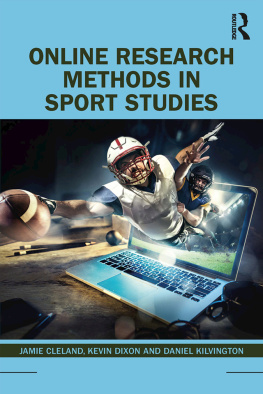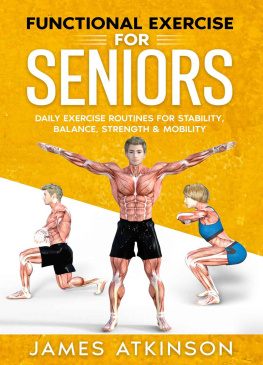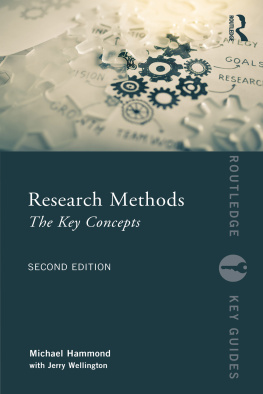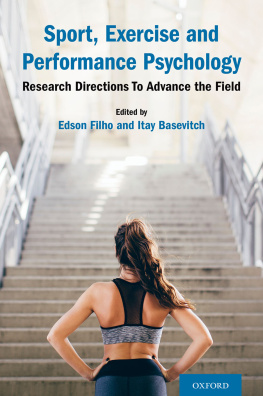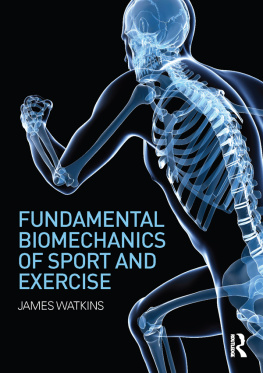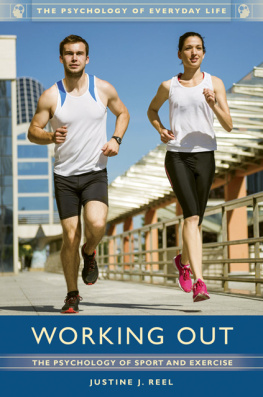Michael Atkinson - Key Concepts in Sport and Exercise Research Methods
Here you can read online Michael Atkinson - Key Concepts in Sport and Exercise Research Methods full text of the book (entire story) in english for free. Download pdf and epub, get meaning, cover and reviews about this ebook. year: 2011, publisher: SAGE Publications, genre: Politics. Description of the work, (preface) as well as reviews are available. Best literature library LitArk.com created for fans of good reading and offers a wide selection of genres:
Romance novel
Science fiction
Adventure
Detective
Science
History
Home and family
Prose
Art
Politics
Computer
Non-fiction
Religion
Business
Children
Humor
Choose a favorite category and find really read worthwhile books. Enjoy immersion in the world of imagination, feel the emotions of the characters or learn something new for yourself, make an fascinating discovery.

- Book:Key Concepts in Sport and Exercise Research Methods
- Author:
- Publisher:SAGE Publications
- Genre:
- Year:2011
- Rating:3 / 5
- Favourites:Add to favourites
- Your mark:
- 60
- 1
- 2
- 3
- 4
- 5
Key Concepts in Sport and Exercise Research Methods: summary, description and annotation
We offer to read an annotation, description, summary or preface (depends on what the author of the book "Key Concepts in Sport and Exercise Research Methods" wrote himself). If you haven't found the necessary information about the book — write in the comments, we will try to find it.
Key Concepts in Sport and Exercise Research Methods — read online for free the complete book (whole text) full work
Below is the text of the book, divided by pages. System saving the place of the last page read, allows you to conveniently read the book "Key Concepts in Sport and Exercise Research Methods" online for free, without having to search again every time where you left off. Put a bookmark, and you can go to the page where you finished reading at any time.
Font size:
Interval:
Bookmark:
Sport and Exercise
Research Methods
John M D Kremer, Aidan Moran,
Cathy Craig and Graham Walker
Stephen Wagg, Belinda Wheaton,
Carlton Brick and Jayne Caudwell
David Kirk, Carlton Cooke, Anne
Flintoff and Jim McKenna
Melanie Smith, Nicola MacLeod and
Margaret Hart Robertson
David Harris
Frances Wilson and Andi Mabhala
Ian Albery and Marcus Munafo
Chris Yuill, Iain Crinson and Eilidh
Duncan
Sport and Exercise
Research Methods

1 Olivers Yard
55 City Road
London EC1Y 1SP
2455 Teller Road
Thousand Oaks, California 91320
B 1/I 1 Mohan Cooperative Industrial Area
Mathura Road
New Delhi 110 044
33 Pekin Street #02-01
Far East Square
Singapore 048763
ISBN 978-1-84860-729-3 (pbk)
Printed in Great Britain by CPI Antony Rowe, Chippenham, Wiltshire
Printed on paper from sustainable resources

| (i) | What is this concept? A definitional introduction to the concept is presented, but only in a quasi-standardised format. Included briefly in this section is a statement of when and why in the research process the concept is important. |
| (ii) | Why is this relevant to me? In this section, the significance of the concept or practice will be reviewed. |
| (iii) | Show me how its used! In this section, some of the more technical aspects of the concept will be discussed, using sport and exercise to further illustrate the significance of the concept or practice. Particular emphasis is given to how the concept relates to the ways by which knowledge is framed and accumulated in research. |
| (iv) | Problems, pitfalls and controversies. In the final section, a concluding set of remarks regarding the methodological problems or debates about the concept or practice is included in order to highlight how the practice of knowledge production in sport and exercise research is contested terrain. |
Font size:
Interval:
Bookmark:
Similar books «Key Concepts in Sport and Exercise Research Methods»
Look at similar books to Key Concepts in Sport and Exercise Research Methods. We have selected literature similar in name and meaning in the hope of providing readers with more options to find new, interesting, not yet read works.
Discussion, reviews of the book Key Concepts in Sport and Exercise Research Methods and just readers' own opinions. Leave your comments, write what you think about the work, its meaning or the main characters. Specify what exactly you liked and what you didn't like, and why you think so.


